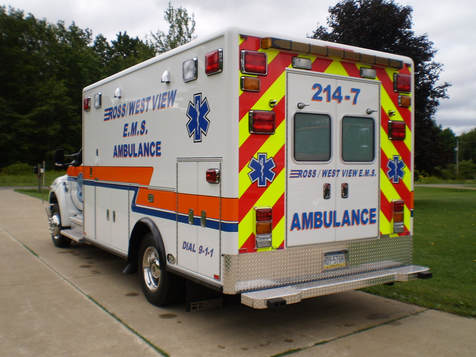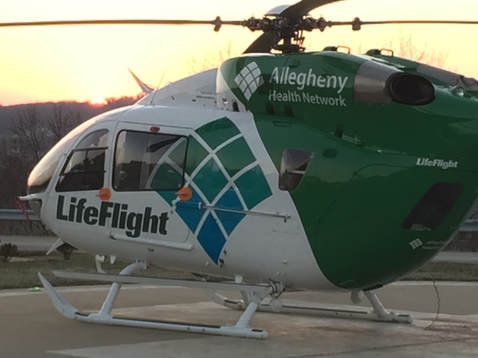Welcome to the Allegheny General Hospital Department of Emergency Medicine's elective in emergency medical services!
The asyncrhonously structured experience is designed to provide the interested student with a broad-based overview of EMS system functions. The rotator will be exposed to various agencies affiliated with the Allegheny Health Network. At the conclusion of the elective, the rotator will have cultivated an increased understanding about the roles and responsibilities of medical directors, first responders, and EMS administrators. A comprehensive course resource document is available from the rotation director.
The asyncrhonously structured experience is designed to provide the interested student with a broad-based overview of EMS system functions. The rotator will be exposed to various agencies affiliated with the Allegheny Health Network. At the conclusion of the elective, the rotator will have cultivated an increased understanding about the roles and responsibilities of medical directors, first responders, and EMS administrators. A comprehensive course resource document is available from the rotation director.
The EMS elective is open to third and fourth year medical students at affiliated schools. The course content is divided into several, "modules." Additional experiences can be created and explored in accordance with the rotating student's interest and expertise.
Module I: Introduction to Emergency Medical Services and Emergency Preparedness / Disaster Response
Contact: Dr. Ben Lawner
The student will work with residents, staff, and faculty to structure the EMS rotation. The student will also review hospital based emergency preparedness initiatives and meet with designated hospital personnel. The student will examine plans for patient "surges" and possible mass casaulty incidents. The student will also complete readings and activities related to the National Incident Management System and enroll in online training sponsored by the Federal Emergency Management Agency. Components of the Emergency Planning module are hosted on the website's mass casaulty and triage sections.
Module 2: Operational Emergency Medical Services
Contact: EMS Agencies
The student will complete required ride a-alongs and engage in the assessment, treatment, and stabilization of prehospital patients. The student will function as an extension of the EMS crew and particiapte in the delivery of prehospital medicine. Students are responsible for scheduling their own rotations. Affiliated EMS agencies are listed on the website under the heading of, "Operational EMS." Subspecialty EMS experience counts toward the ride a-long quota and can be completed in any of the following areas:
-Critical Care Transport/LifeFlight
-Mass Gathering EMS
-Tactical EMS
Module 3: EMS Administration and Research
Contact: Dr. Ben Lawner
The student will attend required meetings and participate in the supervision and medical direction of EMS providers. Meetings involve EMS officials at state, regional, and local levels. The rotation will have a particular focus on hospital based initiatives such as: STEMI committee, trauma QA/QI, and patient centered EMS metrics. The student will also attend the monthly meeting of the EM research interest group.
Module 4: EMS Education
Contact: Mr. David Lindell
The student will have the opportunity to participate in and precept prehospital skills review sessions. Didactic and in-service training sessions are hosted across the network. Students can develop and review continuing education presentations and assist in the delivery of cutting edge instructional material.
Module I: Introduction to Emergency Medical Services and Emergency Preparedness / Disaster Response
Contact: Dr. Ben Lawner
The student will work with residents, staff, and faculty to structure the EMS rotation. The student will also review hospital based emergency preparedness initiatives and meet with designated hospital personnel. The student will examine plans for patient "surges" and possible mass casaulty incidents. The student will also complete readings and activities related to the National Incident Management System and enroll in online training sponsored by the Federal Emergency Management Agency. Components of the Emergency Planning module are hosted on the website's mass casaulty and triage sections.
Module 2: Operational Emergency Medical Services
Contact: EMS Agencies
The student will complete required ride a-alongs and engage in the assessment, treatment, and stabilization of prehospital patients. The student will function as an extension of the EMS crew and particiapte in the delivery of prehospital medicine. Students are responsible for scheduling their own rotations. Affiliated EMS agencies are listed on the website under the heading of, "Operational EMS." Subspecialty EMS experience counts toward the ride a-long quota and can be completed in any of the following areas:
-Critical Care Transport/LifeFlight
-Mass Gathering EMS
-Tactical EMS
Module 3: EMS Administration and Research
Contact: Dr. Ben Lawner
The student will attend required meetings and participate in the supervision and medical direction of EMS providers. Meetings involve EMS officials at state, regional, and local levels. The rotation will have a particular focus on hospital based initiatives such as: STEMI committee, trauma QA/QI, and patient centered EMS metrics. The student will also attend the monthly meeting of the EM research interest group.
Module 4: EMS Education
Contact: Mr. David Lindell
The student will have the opportunity to participate in and precept prehospital skills review sessions. Didactic and in-service training sessions are hosted across the network. Students can develop and review continuing education presentations and assist in the delivery of cutting edge instructional material.

